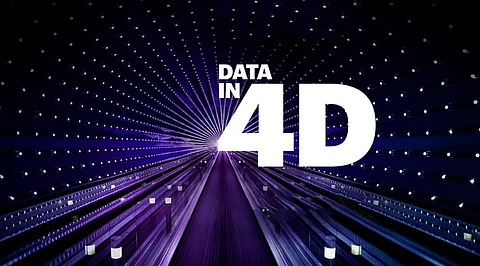
- Insights
- Cryptocurrencies
- Stocks
- White Papers
- Industry
- Geography
- Insights
- Cryptocurrencies
- Stocks
- White Papers
- Industry
- Geography


AI is transforming industries as we know, even the tourism industry that took a big hit during the pandemic. With lots of data and the right technological platform, AI is enabling a real-time digital traveler experience. All that it requires is trustworthy data that can travel seamlessly across IoT networks of intelligence sensors, digital portals, and wearable devices. Soon, AI will become omnipresent, and to scale it to such a level, there needs to be data. Data is such a critical aspect that it determines if AI efforts will succeed or not. This is why organizations are developing data-first approaches and recognizing data as a multi-dimensional process that is Dynamic, Dependable, Distributed, and Democratized, also known as Data in 4D.
Data in 4D is a result of a combination of skills, technologies, and approaches. Enterprises are exploring ways to leverage this technology by creating business strategies and models that feed on discoverable, visible, usable, and connected data. With Data in 4D, organizations can identify different kinds of data like structured, semi-structured, and unstructured, and derive insights out of it.
A recent study by Accenture and Everest Group on 200 global firms highlighted that 72% forecast double-digit growth spent for data and analytics. To justify this expenditure, investments must suffice for the four dimensions of data.
Dynamic data is referred to the information that derives from creating a limitless data value chain. The IT stack that contains the database, applications, and infrastructure are no longer independent entities. Advanced systems are surpassing the limit between data, infrastructure, and applications, and between humans and machines, too. Dynamic data is helping enterprises leverage the speed of obtaining insights, retune supply chains and enable responsive customer interactions.
Dependable data is important to build trust. Data is both an asset and a liability and enterprises should ensure that their approach prioritizes objectivity to promote trust as equally as growth and profitability. This means enterprise data should be of quality, provenance, and security. Businesses must also keep in mind the security aspect of data.
Distributed data is information that is not confined within the boundaries of the business. Data sharing with clients, vendors, and competitors are critical for data monetization, which leads to increased efficiency, higher revenue, and reduced costs. Data sharing enables rapid development of the business, hence organizations must share data across internal and external ecosystems, securely.
Democratized data makes business users' data literate. To become a data-powered enterprise, business users must access and explore datasets, identify new opportunities and generate relevant, trustworthy insights to create a system where people have access to the required skills and technologies to understand data.
This is another type of data and digital transformation journey. The right way to start this approach is with the CEO taking ownership of the enterprise data strategy and hiring a C-suite executive to build and work on it. Then, the organization should invest in building an enterprise data platform that will power data supply chains to be agile, secured, and up to speed. Additionally, creating a culture of data literacy where businesses can explore data, find new opportunities, and generate business insights that will take the business forward.
